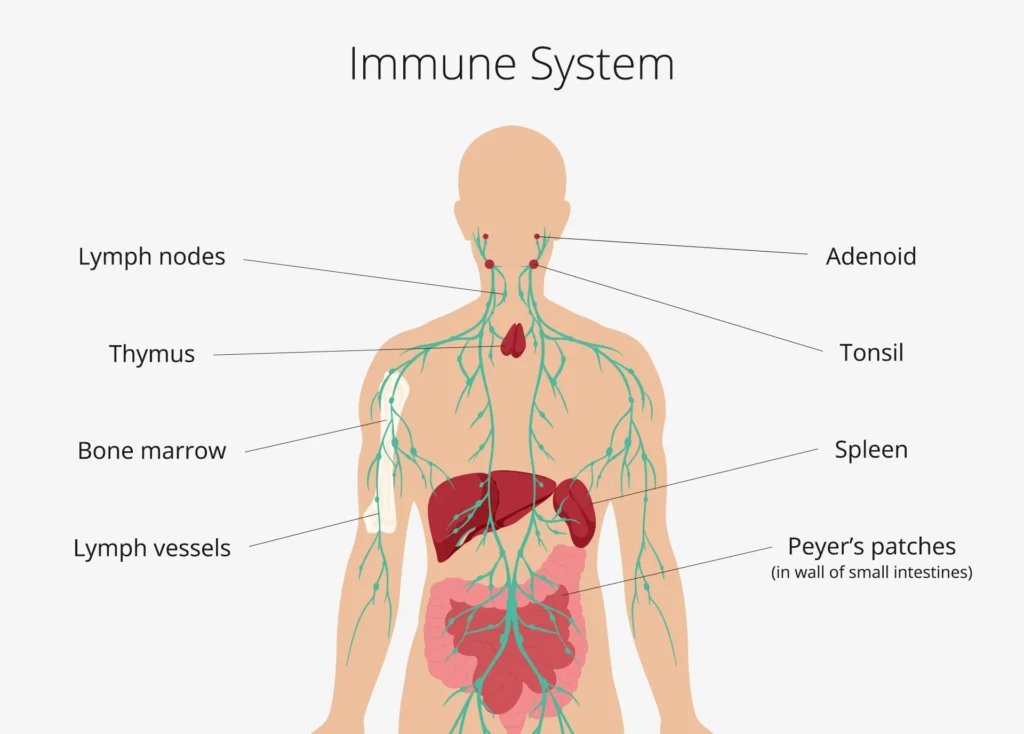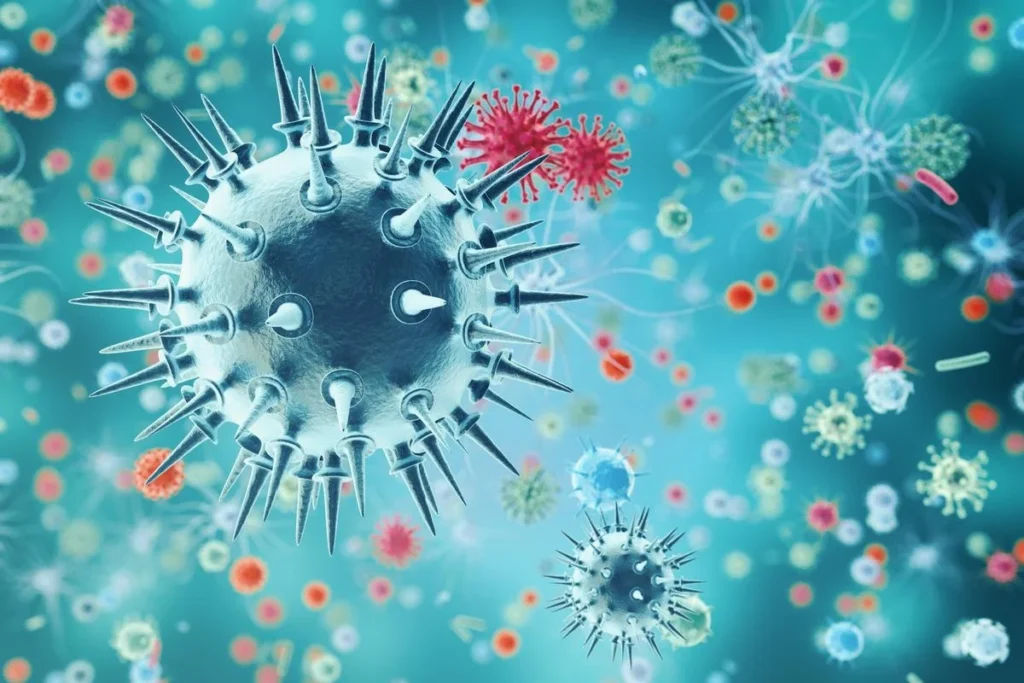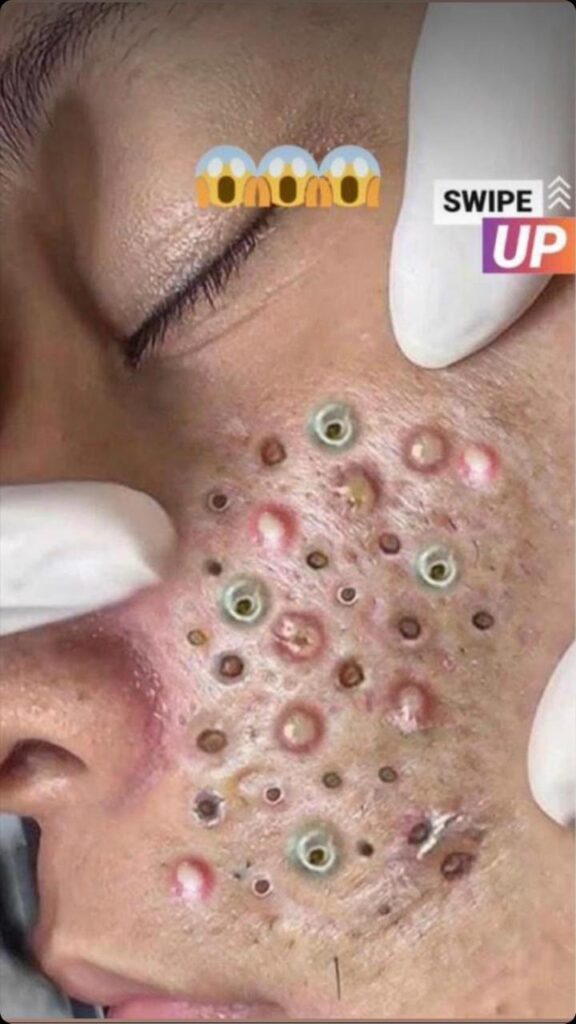Your immune systems is like a shield that protects your body from harmful germs and infections. It helps you stay healthy and recover when you’re sick or hurt. You can keep your immune system strong by eating healthy foods, staying active, and getting plenty of rest.
What is the Immune System?
- Your body has a network of organs, white blood cells, proteins, and chemicals that defend against harmful germs and other threats. It also aids in recovery when you’re sick or injured.How Does It Work?
The body has an important role in keeping you healthy. Here’s how it functions:Keeps out germs: It stops harmful invaders from getting into your body. - Fights germs: It destroys invaders like bacteria and viruses.
- Reduces harm: If some invaders do get inside, it limits the damage they can cause.
- Repairs your body: It helps heal wounds and infections.
- Adapts to new threats: It learns to fight new types of germs and dangers.
The immune system protects you from things like:
- Bacteria
- Viruses
- Fungi that cause infections
- Parasites
- Cancer cells
Digital Pakistani Tip: Just as your body requires strength to stay healthy, a strong online presence and security are crucial for safety in the digital world. Protect both your health and your digital security!
What is the Immune System?
Your body has a defense team made up of organs, white blood cells, proteins, and chemicals that work together to protect you from harmful germs. It also aids in healing when you’re sick or injured, helping you stay healthy and strong.
How Does the Immune System Work?
The immune system works hard to keep you safe. Here’s how it does its job:
Keeps Germs Out: It tries to stop germs from getting into your body, just like a Digital Pakistani keeps their personal information safe online.
Fights Germs: If germs enter, your body’s defenses fight them off, much like firewalls protect your computer from online threats.
Limits Damage: If some germs slip through, your body works to minimize harm, similar to antivirus software limiting damage from a virus.
Repairs Your Body: After an attack, your body helps heal and recover, just like restoring data after a tech issue.
Learns New Threats: Your body adapts to fight new germs over time, just as security systems evolve to protect against emerging online dangers.
What Does the Immune System Protect You From?
Your body’s defenses protect you from:
Bacteria: Tiny germs that can cause infections like the flu.
Viruses: Even smaller than bacteria, they can make you sick (e.g., a cold or COVID-19).
Fungi: Germs that can lead to skin infections.
Parasites: Small creatures living in your body that can cause illness.
Cancer Cells: The body helps eliminate abnormal cells that could develop into cancer.
How to Keep Your Immune System Strong
Just like a Digital Pakistani protects their online security, you can keep your immune system strong by:
- Eating Healthy: Eating good food like fruits and vegetables helps your immune system.
- Exercising: Moving your body helps your immune system stay strong.
- Getting Enough Sleep: Rest helps your body heal and recharge.
- Reducing Stress: Too much stress can weaken your immune system, so relax and take care of yourself.
Just like you protect your digital life, it’s important to protect your health. A strong immune system will help you stay safe and healthy, ready to face whatever comes your way!
What Parts Make Up the Immune System?
Your immune system is made up of several parts that work together to keep you healthy. Each part has a special role, just like different tools in a toolbox. Here are the main components of your immune system:
- White Blood Cells
These are the soldiers of your White blood cells find and attack harmful germs to keep you safe. There are many types of white blood cells, each with a unique job, and they communicate with each other to protect your body
- Antibodies
Antibodies are like special keys that attach to invaders like viruses or bacteria. Once they latch on, they help destroy the germs and prevent them from harming your body.
- Cytokines
Cytokines are proteins that act as messengers in your They tell the white blood cells where to go and what to do. Some cytokines help with inflammation, which happens when your body is fighting off invaders or healing damage.
- Complement System
This is a group of proteins that works with other cells in your body to fight off invaders and help heal injuries. Think of it as the support team that steps in to make sure everything works together smoothly.
- Lymph Nodes
Lymph nodes are small, bean-shaped organs scattered throughout your body. They filter out waste and keep the good stuff, like nutrients, from the fluid that drains from your tissues and cells. They also help your immune system find and fight germs. These nodes are an important part of your body’s lymphatic system, which supports your
Just like a Digital Pakistani protects their online safety, your body has parts that protect you from harm. Eating healthy, staying active, and resting help your immune system work well to keep you healthy.
Parts of the Body That Help Your Immune System
Your immune system relies on several important organs and tissues to keep you safe. Here’s how each one plays a role in defending your body:
Spleen
The spleen stores white blood cells, which are crucial for fighting off germs. It also filters your blood, recycling old cells and making new ones to keep your body running smoothly.
Tonsils and Adenoids
These are located in your throat and nose. They act as the first line of defense, trapping invaders like bacteria and viruses before they can enter your body.
Thymus
The thymus is a small organ that helps T-cells (a type of white blood cell) mature. Once they’re ready, they travel throughout your body to protect you from harm.
Bone Marrow
Inside your bones, there’s a soft tissue called bone marrow. This is like a factory that makes all your blood cells, including white blood cells that help your immune system defend against germs.
Skin
Your skin acts as a barrier, stopping germs from entering your body. It also produces oils and releases special immune cells to fight off threats.
Mucosa
This protective membrane lines many parts of your body, like your nose and digestive system. It produces mucus to trap invaders, like germs, which your body can clear.
Each of these parts works together to keep your immune system strong, helping your body stay healthy and fight off harmful invaders. Just like how you protect your digital life, it’s important to take care of your body and immune system so it can do its job well.
Conditions and Disorders
What disorders and diseases can affect the immune system?
Conditions That Can Affect Your Immune System
Sometimes, things can happen that make your immune system not work the way it should. Here are some common ones:
Allergies
An allergy is when your immune system reacts too strongly to something that’s not harmful, like pollen or certain foods. This can cause sneezing, itching, or worse reactions.
Autoimmune Diseases
In autoimmune diseases, the body’s defense system attacks its own healthy cells. This can cause pain and damage, like in lupus or arthritis.
Primary Immunodeficiency Diseases
These are conditions you’re born with that make your immune system weaker. This means you can get sick more easily because your body can’t fight off germs as well.
Infectious Diseases
Infectious diseases happen when germs like bacteria or viruses enter your body and make you sick. Diseases like HIV or mono can weaken your immune system and make it harder to stay healthy.

Cancer
Some cancers, like leukemia or lymphoma, can affect your immune system. They change how your body makes blood cells, which makes it harder to fight infections.
Sepsis
Sepsis occurs when your body overreacts to an infection, causing your defenses to attack your own organs, which can lead to serious damage.
Certain conditions can make it harder for your body to protect itself. It’s crucial to seek medical help if you’re experiencing any of them.
Signs of Defense Issues
If your body’s defenses aren’t functioning properly, you might notice these symptoms:
- Constant fatigue
- Unexplained fever
- Unintentional weight loss
- Excessive night sweating
- Itchy skin
- Sore muscles
- Numb or tingling fingers or toes
- Difficulty focusing or paying attention
Losing hair.
Redness, rashes, or swelling on your skin.
Swollen lymph nodes in your neck, armpits, or groin.
Common Tests for Immune System Health
Doctors use blood tests to check how well your immune system is working. Some tests they might use include:
Antibody test: Checks for certain proteins your body makes to fight germs.
Complete blood count: Looks at the number of blood cells in your body.
Complement blood test: Measures proteins in your blood that help your immune system fight infections.
If you notice any of these symptoms, it’s a good idea to see a doctor to check your immune system.
What medications can affect my immune system?
Some medications are helpful for your health, but they can also make it harder for your body to defend itself. These include:
- Corticosteroids
- Immunosuppressants
- Chemotherapy and other cancer treatments
If you’re taking any of these, it’s a good idea to talk to your doctor about how to keep your body’s defenses strong.
How can I boost my immune system naturally?
No one likes getting sick, and it’s natural to wonder how to stay healthier. Since the body’s defenses are complex, there’s no one-size-fits-all solution. That’s why it’s helpful to talk to your doctor. They can offer personalized advice based on your health history and help you assess your lifestyle and daily habits to identify beneficial changes.
Here are some easy tips to keep your body’s defenses strong:
Eat Healthy Foods
Put as many fruits, veggies, lean meats, and whole grains as possible on your meal. . These foods help your immune system stay strong. Ask your doctor if special diets, like the Mediterranean diet, can help you get the vitamins your body needs.
Exercise Regularly
Exercise is great for your health, including your immune system. Your doctor can help you find an exercise plan that works for you and your health needs.
Maintain a Healthy Weight
Being overweight can affect your immune system. Talk to your doctor about what a healthy weight is for you and work together to reach it.
Get Enough Sleep
Not getting enough sleep can make it harder for your immune system to work well. Make sure you’re getting enough rest.
Stay on Top of Vaccines
Vaccines help train your body to fight off germs that can make you sick. Talk to your doctor about which vaccines are right for you and when you should get them.
Avoid Smoking
Smoking and using tobacco products can weaken your body’s defenses and raise the risk of other health issues. If you smoke, talk to your doctor for support in quitting.
By following these simple steps, you can help keep your body’s defenses functioning at their best.
Why is my immune system so weak?
No one likes getting sick, and it’s natural to want to know how to stay healthier. Since the body’s defenses are complex, there’s no one-size-fits-all solution. Your doctor can offer personalized advice based on your health history and help you assess your lifestyle and daily habits to identify beneficial changes.
Here are some simple tips to keep your body’s defenses strong:
Eat Healthy Foods
These foods help your immune system stay strong. Ask your doctor if special diets, like the Mediterranean diet, can help you get the vitamins your body needs.
Exercise Regularly
Exercise is excellent for your health. Your doctor can assist in creating an exercise plan tailored to your needs and overall well-being.
Maintain a Healthy Weight
Being overweight can impact your body’s ability to stay healthy. Consult your doctor to determine a healthy weight for you and work together to achieve it.
Get Enough Sleep
Not getting enough sleep can make it harder for your body to function properly. Ensure you’re getting enough rest to stay healthy.
Stay on Top of Vaccines
Vaccines help train your body to fight off germs that can make you sick. Talk to your doctor about which vaccines are right for you and when you should get them.
Avoid Smoking
Smoking and using tobacco products can harm your body’s defenses and raise the risk of other health issues. Talk to your doctor for support in quitting.
By following these simple steps, you can help keep your body’s defenses functioning at their best.



